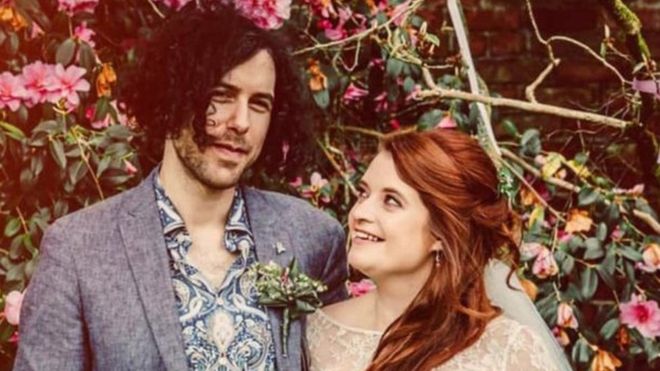
Emma De Souza with her American born husband Jake in citizenship row with British Home Office
In 2017, Co Derry woman Emma De Souza won a case against the Home Office after it deemed she was British when her US-born husband applied for a residence card.
The Good Friday Agreement allows people to identify as British, Irish or both.
But on Monday an immigration tribunal upheld an appeal of the case, brought by the Home Office.
Mrs De Souza said she was “disappointed” and that she would now seek for the case to be heard in the Court of Appeal.
In September, judges in London considered the case in the Upper Tribunal, which handles appeals against decisions made in First Tier Immigration Tribunals.
The Home Office argued that people born in Northern Ireland remain British citizens according to the law, even if they identify as Irish.
Anyone born in Northern Ireland has the right to identify as Irish or British or both, thanks to the Good Friday Agreement, signed in April 1998 by the British and Irish governments and Northern Ireland’s political parties.
The agreement said the British and Irish governments would: “Recognise the birthright of all the people of Northern Ireland to identify themselves and be accepted as Irish or British, or both, as they may so choose, and accordingly confirm that their right to hold both British and Irish citizenship is accepted by both Governments and would not be affected by any future change in the status of Northern Ireland.”
Responding to the decision, Mrs De Souza criticised the British government and said it had failed, in her view, to implement the agreement.
In its ruling, the tribunal judges determined that despite the Good Friday Agreement giving people the right to identify as British or Irish or both, it did not supersede the 1981 British Nationality Act, which sets out the terms of citizenship for people born in the UK, including in Northern Ireland.
The judges also said: “To make citizenship by birth in the United Kingdom (or any part of it) dependent on consent raises a host of difficult issues.”
Lawyers for Mrs De Souza and her husband had argued that on one of the web pages of the Northern Ireland Executive, there is a passage which says “people born in Northern Ireland can choose to be British citizens, Irish citizens or both”.
But the court ruled that the webpage was not “an authoritative source of law” and said it must therefore be regarded as wrong.

Emma De Souza raised her case in Europe in May this year
However, in its ruling the judges said that: “As a matter of law, Mrs De Souza is, at present, a British citizen at the current time.”
They added: “Whilst we fully appreciate her strength of feeling on this matter, it is not disproportionate… for her nevertheless to be required to give notice of revocation, if she wishes only to be a citizen of Ireland.”
The ruling added that in order to renounce British citizenship, an individual must pay a £200 fee.
Mrs De Souza has said she will now try to take the case to the Court of Appeal.
Tags:




